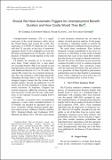Should We Have Automatic Triggers for Unemployment Benefit Duration and How Costly Would They Be?
Author(s)
Chodorow-Reich, Gabriel; Ganong, Peter; Gruber, Jonathan
DownloadPublished version (567.1Kb)
Publisher Policy
Publisher Policy
Article is made available in accordance with the publisher's policy and may be subject to US copyright law. Please refer to the publisher's site for terms of use.
Terms of use
Metadata
Show full item recordAbstract
<jats:p> We model automatic trigger policies for unemployment insurance by simulating a weekly panel of individual labor market histories, grouped by state. We reach three conclusions: (i) policies designed to trigger immediately at the onset of a recession result in benefit extensions that occur in less sick labor markets than the historical average for benefit extensions, (ii) the ad hoc extensions in the 2001 and 2007-2009 recessions compare favorably ex post to common proposals for automatic triggers, and (iii) compared to ex post policy, the cost of common proposals for automatic triggers is close to zero. </jats:p>
Date issued
2022-05-01Department
Massachusetts Institute of Technology. Department of EconomicsJournal
AEA Papers and Proceedings
Publisher
American Economic Association
Citation
Chodorow-Reich, Gabriel, Ganong, Peter and Gruber, Jonathan. 2022. "Should We Have Automatic Triggers for Unemployment Benefit Duration and How Costly Would They Be?." AEA Papers and Proceedings, 112.
Version: Final published version